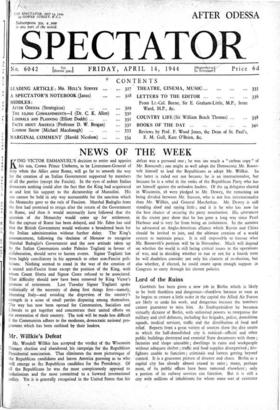Mr. Willkie's Defeat
Mr. Wendell Willkie has accepted the verdict of the Wisconsin Primary election and abandoned his campaign for the Republican Presidential nomination. That eliminates the most picturesque of the Republican candidates and leaves America guessing as to who will emerge as the Republican candidate for the Presidency. Of all the Republicans he was the most conspicuously opposed to isolationism and the most committed to a forward international policy. Yet it is generally recognised in the United States that his defeat was a personal one ; he was too much a "carbon copy" of Mr. Roosevelt ; one might as well adopt the Democratic Mr. Roose- velt himself to lead the Republicans as adopt Mr. Willkie. So the latter is ruled out not because he is an internationalist, but because he is a rebel in the ranks of the Republican Party who has set himself against the orthodox leaders. Of the 24 delegates elected in Wisconsin, 18 were pledged to Mr. Dewey, the remaining six being divided between Mr. Stassen, who is not less internationalist than Mr. Willkie, and General MacArthur. Mr. Dewey is still standing aloof and saying little ; and it is he who has now far the best chance of securing the party nomination. His utterances in the recent past show that he has gone a long way since Pearl Harbour and is very far from being an isolationist. In the autumn he advocated an Anglo-American alliance which Russia and China should be invited to join, and the ultimate creation of a world system to maintain peace. It is still impossible to foresee what Mr. Roosevelt's- position will be in November. Much will depend on whether the world is still facing critical issues in the operations of war, and in deciding whether to run or not, for a fourth term he will doubtless consider not only his chances of re-election, but also whether, if elected, he could count upon enough support in Congress to carry through his chosen policies.


























